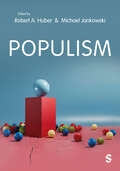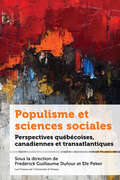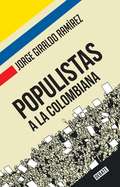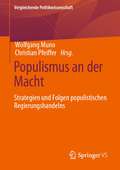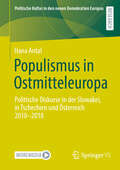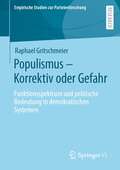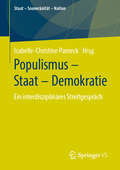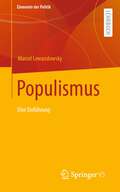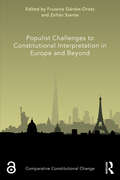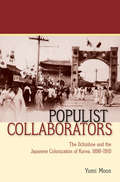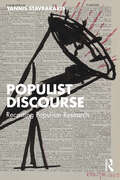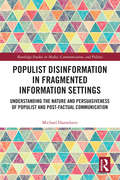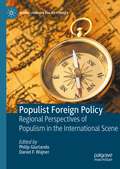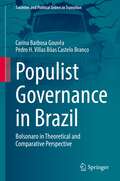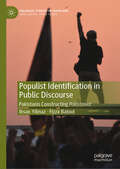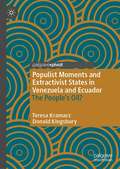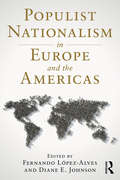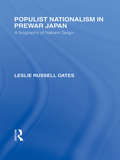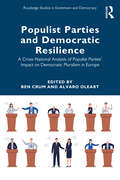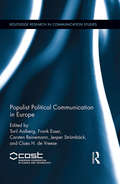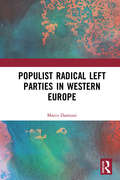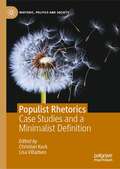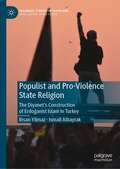- Table View
- List View
Populism: An Introduction
by Michael Jankowski Robert A. HuberAfter reading this groundbreaking textbook, you will have a solid understanding of state-of-the-art populism research and be ready to take a deep dive into more complex debates. Every chapter follows a clear and logical structure and employs the following learning features to help you grapple with the complex topic of Populism: • Introduces the most state-of-the-art theories, methods, and empirical findings in populism research. • Examples from populism in different regions of the world to illustrate the variation within populism studies around the globe. • Learn by doing: ‘hands on’ exercises and the ‘measuring populism’ chapters encourage students to play with data and start researching populism independently. • Chapters on hot topics in populism, such as populism, media and political communication, and the impact of populist parties in government. • Various didactical features will allow you to trace your progress and guide you through the text-book. Our expert authors will guide you through each chapter with carefully selected examples from diverse contexts, illustrating the multifaceted nature of populism. Looking at examples from around the world will help you to understand how populism shows up in different political settings. It will give you an introduction to the topic that allows you to command the field of empirical populism research. Robert A. Huber is Professor of Political Science Research Methods at the University of Salzburg. Michael Jankowski is Team Lead for the Data Science group in the Federal German Chancellery. He is also affiliated with the University of Oldenburg.
Populism: An Introduction
by Michael Jankowski Robert A. HuberAfter reading this groundbreaking textbook, you will have a solid understanding of state-of-the-art populism research and be ready to take a deep dive into more complex debates. Every chapter follows a clear and logical structure and employs the following learning features to help you grapple with the complex topic of Populism: • Introduces the most state-of-the-art theories, methods, and empirical findings in populism research. • Examples from populism in different regions of the world to illustrate the variation within populism studies around the globe. • Learn by doing: ‘hands on’ exercises and the ‘measuring populism’ chapters encourage students to play with data and start researching populism independently. • Chapters on hot topics in populism, such as populism, media and political communication, and the impact of populist parties in government. • Various didactical features will allow you to trace your progress and guide you through the text-book. Our expert authors will guide you through each chapter with carefully selected examples from diverse contexts, illustrating the multifaceted nature of populism. Looking at examples from around the world will help you to understand how populism shows up in different political settings. It will give you an introduction to the topic that allows you to command the field of empirical populism research. Robert A. Huber is Professor of Political Science Research Methods at the University of Salzburg. Michael Jankowski is Team Lead for the Data Science group in the Federal German Chancellery. He is also affiliated with the University of Oldenburg.
Populism: Performance, Political Style, And Representation (Key Concepts in Political Theory)
by Benjamin MoffittPopulism is the key political phenomenon of the 21st century. From Trump to Brexit, from Chávez to Podemos, the term has been used to describe leaders, parties and movements across the globe who disrupt the status quo and speak in the name of ‘the people’ against ‘the elite’. Yet the term remains something of a puzzle: poorly understood, vaguely defined and, more often than not, used as a term of abuse. In this concise and engaging book, leading expert Benjamin Moffitt cuts through this confusion. Offering the first accessible introduction to populism as a core concept in political theory, he maps the different schools of thought on how to understand populism and explores how populism relates to some of the most important concepts at the heart of political debate today. He asks: what has populism got to do with nationalism and nativism? How does it intersect with socialism? Is it compatible with liberalism? And in the end, is populism a good or bad thing for democracy? This book is essential reading for anyone – from students and scholars to general readers alike – seeking to make sense of one the most important and controversial issues in the contemporary political landscape.
Populisme et sciences sociales: Perspectives québécoises, canadiennes et transatlantiques (Politique et politiques publiques)
by Elke Winter Victor Armony Emily Laxer Geneviève Tellier Olivier Audet Olivier Bélanger-Duchesneau Olivier Bérubé-Sasseville Joanie Bouchard Stéphanie Chouinard Sylvain Crépon Allison Harell Isabel L. Krakoff Mathieu Lizotte Djamila Mones Sébastien Mosbah-Natanson Anke Patzelt Derek J. Robey François Tanguay Annie VerreaultLe populisme n’a jamais été aussi populaire en tant que concept, tant dans les débats académiques que publics. Il est une des réalités politiques, en particulier dans sa variété de droite, qui a suscité à la fois la plus grande surprise par son ampleur et le plus de questionnements sur sa nature depuis le Brexit et l’élection présidentielle de Donald Trump en 2016. Au Canada, l’actualité politique depuis la COVID-19 semble donner raison à la thèse voulant que ce pays ne soit pas une exception à la vague populiste globale. Dans ce nouveau contexte politique, il devient crucial d’approfondir notre compréhension du populisme à l'aide des outils analytiques des sciences sociales, ce que propose ce volume édité. Populisme et sciences sociales offre des contributions théoriques, empiriques et multidisciplinaires à l’étude de l'un des phénomènes les plus marquants du XXIe siècle.
Populismo en Colombia
by Jorge Giraldo RamirezUn completo estudio sobre el populismo en Colombia y sus consecuencias. <P><P>El populismo reverdece en el mundo. Crece allí donde las instituciones democráticas y liberales fallan. Se nutre del inconformismo y se extiende como una incitación a salidas desesperadas. <P> Pero, a pesar de ser un término de uso frecuente la noción misma de populismo se ha oscurecido en manos de la especulación, la falta de contexto histórico y la ausencia de estudios locales. <P>Populistas a la colombiana busca llenar ese vacío en momentos en que el país, en medio de la contienda electoral que sigue a los acuerdos de La Habana, asiste a la recomposición de su mapa político y el surgimiento de nuevos líderes. <P>En conjunto, el libro reconstruye el origen y sentidos del populismo, sus versiones regionales, los contradictores que han colaborado en su definición y describe las formas que adoptó en Colombia, en tres casos significativos: Jorge Eliécer Gaitán, Gustavo Rojas Pinilla y Álvaro Uribe, y otros menos representativos, como Gustavo Petro. <P> De cierre, Jorge Giraldo Ramírez reflexiona, muy a propósito de la actual coyuntura, sobre la probabilidad de otro otro populismo en Colombia.
Populismus an der Macht: Strategien und Folgen populistischen Regierungshandelns (Vergleichende Politikwissenschaft)
by Wolfgang Muno Christian PfeifferPopulisten wie Donald Trump, Viktor Orbán oder Jair Bolsonaro verändern die Weltpolitik und stellen etablierte institutionelle Verfahrensweisen in Frage. Der Sammelband betrachtet die Regierungsführung populistischer Akteure und gibt einen Einblick in politische Strategien und Folgen des Handelns von Populisten an der Macht. Die leitende Fragestellung ist, wie es Populismus mit der Demokratie hält: Wirkt er sich ausschließlich negativ auf die Qualität einer Demokratie aus oder gibt es auch Anzeichen einer positiven Wirkung von Populismus im Sinne eines Korrektivs vermeintlicher Fehlentwicklungen? Wann hört populistisches Regieren auf und wann fängt autokratisches Regieren an? Die Substanz von Populismus zeigt sich letztlich an der Macht.Der vorliegende Sammelband verfolgt das Ziel, sich dieser Demokratiefrage empirisch zu nähern. Neben quantitativ-vergleichenden Beiträgen zu Auswirkungen auf die Demokratiequalität und zu anti-muslimischen Einstellungen werden populistische Mechanismen und Praktiken in Ländern wie Indien, den USA, Venezuela, Argentinien, Brasilien, Österreich, Spanien, Polen, Ungarn, Bulgarien, Rumänien sowie Österreich analysiert. Das Interesse liegt insbesondere auf der Entwicklung der Regime- bzw. Demokratiequalität und der Variation von Art und Wirkung populistischer Herrschaft in unterschiedlichen Kontexten und verschiedenen Weltregionen.
Populismus in Ostmitteleuropa: Politische Diskurse in der Slowakei, in Tschechien und Österreich 2010–2018 (Politische Kultur in den neuen Demokratien Europas)
by Hana AntalDer in Europa erstarkende Populismus steht seit Jahren im Fokus wissenschaftlicher Debatten. Im Unterschied zum westeuropäischen Rechtspopulismus wird dem Populismus aus Ostmitteleuropa wenig Aufmerksamkeit geschenkt, und komparative Studien werden selten durchgeführt. Dieses Buch befasst sich mit den Gemeinsamkeiten und Unterschieden in den Inhalten, Funktionslogiken und Ausbreitung der Populismen in der Slowakei, in Tschechien und Österreich. Populisten in den drei historisch verflochtenen Nachbarländern ähneln sich in ihrer Rhetorik – sie sind jedoch nicht alle als Rechtspopulisten zu klassifizieren und einander gleichzusetzen. Diese vergleichende Studie untersucht die Populismen anhand der Diskurse über die Flüchtlingskrise, die Eurokrise, Ausländer und Minderheiten zwischen 2010 und 2018. Die Autorin zeigt darin auf, inwiefern sich die Populismen in den postsozialistischen Ländern durch spezifische Merkmale von den „westlichen“ Varianten, d. h. von Populismen in Ländern ohne staatssozialistische Vergangenheit, unterscheiden. Populismus wird als ein Phänomen vorgestellt, das zwar allgemeingültige Merkmale aufweist, aber gleichzeitig stark kontextgebunden ist. Dabei wird deutlich, wie sich die jeweils unterschiedlichen historischen Entwicklungspfade und die damit einhergehenden Merkmale der politischen Parteiensysteme und Kulturen in den Ausprägungen des Populismus in den drei Ländern manifestieren.
Populismus – Korrektiv oder Gefahr: Funktionsspektrum und politische Bedeutung in demokratischen Systemen (Empirische Studien zur Parteienforschung)
by Raphael GritschmeierIn der öffentlichen Diskussion stellt Populismus vor allem im europäischen Raum einen negativ konnotierten Begriff dar. Meist werden populistische Parteien als Gefahr für die liberale Demokratie, ihre Institutionen und Garantien betrachtet. Die Forschung schreibt ihnen jedoch bereits seit längerem eine potenzielle Wirkung als Korrektiv zu. Diese Ausgangslage nimmt die vorliegende Studie zum Anlass, die beiden Wirkperspektiven (Korrektiv/Gefahr) zu systematisieren und mithilfe von jeweils vier zugehörigen Funktionen auszudifferenzieren. Dieses theoretisch ausbuchstabierte Funktionstableau wird anhand der rechtspopulistischen Fallbeispiele Alternative für Deutschland (AfD) und Freiheitliche Partei Österreichs (FPÖ) empirisch geprüft. Ausgehend von der hohen Kontextaffinität von (Rechts-)Populismus steht die Frage im Mittelpunkt, welche Funktionen (rechts-)populistische Akteure innerhalb der liberal-demokratischen Ordnung übernehmen und unter welchen Kontextbedingungen sie diese aus- und erfüllen können.
Populismus – Staat – Demokratie: Ein interdisziplinäres Streitgespräch (Staat – Souveränität – Nation)
by Isabelle-Christine PanreckZwar fällt die Populismusforschung auf den ersten Blick ins Kerngebiet der Politikwissenschaft, aber keine Geistes- oder Sozialwissenschaft verschließt sich der Debatte. Dabei erfolgt eine interdisziplinäre Verknüpfung der einzelnen Diskussionsfäden bislang nur vereinzelt. Der Sammelband stößt in die Lücke, indem er erstmals Vertreterinnen und Vertreter der Kunst-geschichte, Ökonomie, Philosophie, Politikwissenschaft, Politolinguistik, Städtebau/Architektur und Theologie zum Streitgespräch versammelt.
Populismus: Eine Einführung (Elemente der Politik)
by Marcel LewandowskyDas Lehrbuch bietet eine einführende Darstellung des Populismus in allen relevanten Facetten. Namentlich adressiert das Buch seine unterschiedlichen Manifestationen (als Ideologie, Parteiprogramm und individuelle Einstellung), stellt den Populismus in vergleichender Perspektive vor und analysiert die Ursachen für den Wahlerfolg populistischer Parteien. Ferner diskutiert das Buch die Auswirkungen populistischer Parteien auf die Demokratie und den Parteienwettbewerb.
Populist Challenges to Constitutional Interpretation in Europe and Beyond (Comparative Constitutional Change)
by Zoltán Szente Fruzsina Gárdos-OroszThis book explores the relationship between populism or populist regimes and constitutional interpretation used in those regimes. The volume discusses the question of whether contemporary populist governments and movements have developed, or encouraged new and specific constitutional theories, doctrines and methods of interpretation, or whether their constitutional and other high courts continue to use the old, traditional interpretative tools in constitutional adjudication. The book is divided into four parts. Part I contains three chapters elaborating the theoretical basis for the discussion. Part II examines the topic from a comparative perspective, representing those European countries where populism is most prevalent, including Austria, Croatia, the Czech Republic, Greece, Hungary, Italy, Poland, Romania, Spain, and the United Kingdom. Part III extends the focus to the United States, reflecting how American jurisprudence and academia have produced the most important contributions to the theory of constitutional interpretation, and how recent political developments in that country might challenge the traditional understanding of judicial review. This section also includes a general overview on Latin America, where there are also some populist governments and strong populist movements. Finally, the editors’ closing study analyses the outcomes of the comparative research, summarizing the conclusions of the book. Written by renowned national constitutional scholars, the book will be essential reading for students, academics and researchers working in Constitutional Law and Politics.
Populist Collaborators: The Ilchinhoe and the Japanese Colonization of Korea, 1896–1910
by Yumi MoonAn empire invites local collaborators in the making and sustenance of its colonies. Between 1896 and 1910, Japan's project to colonize Korea was deeply intertwined with the movements of reform-minded Koreans to solve the crisis of the Choson dynasty (1392-1910). Among those reformers, it was the Ilchinhoe (Advance in Unity Society)-a unique group of reformers from various social origins-that most ardently embraced Japan's discourse of "civilizing Korea" and saw Japan's colonization as an opportunity to advance its own "populist agendas." The Ilchinhoe members called themselves "representatives of the people" and mobilized vibrant popular movements that claimed to protect the people's freedom, property, and lives. Neither modernist nor traditionalist, they were willing to sacrifice the sovereignty of the Korean monarchy if that would ensure the rights and equality of the people.Both the Japanese colonizers and the Korean elites disliked the Ilchinhoe for its aggressive activism, which sought to control local tax administration and reverse the existing power relations between the people and government officials. Ultimately, the Ilchinhoe members faced visceral moral condemnation from their fellow Koreans when their language and actions resulted in nothing but assist the emergence of the Japanese colonial empire in Korea. In Populist Collaborators, Yumi Moon examines the vexed position of these Korean reformers in the final years of the Choson dynasty, and highlights the global significance of their case for revisiting the politics of local collaboration in the history of a colonial empire.
Populist Discourse: Recasting Populism Research
by Yannis StavrakakisPopulist Discourse: Recasting Populism Research offers a refreshingly innovative discourse theory perspective on populist phenomena. Reading this book will help you familiarize yourself with the historical genealogy of significant populist phenomena from the end of the 19th century onwards and with the main conceptual/theoretical accounts established to analyse them. Mainstream conceptualizations of populism in both academia and public discourse are critically discussed in order to map new, promising avenues for research. Inspired by the works of Ernesto Laclau and Chantal Mouffe, the book addresses current challenges within populism research and highlights the new directions that a conceptually nuanced, theoretically rigorous and historically informed discursive orientation can contribute to the contemporary study of populism. Without sacrificing attention to detail, strong bibliographical support and a focus on the future development of populism research, Populist Discourse is written in accessible language to engage populism scholars, advanced undergraduates and graduate-level students within the field of political science. Due to its interdisciplinary character, it will also appeal to readers associated with various politically informed area studies and the broader field of ideology and discourse analysis.
Populist Disinformation in Fragmented Information Settings: Understanding the Nature and Persuasiveness of Populist and Post-factual Communication (Routledge Studies in Media, Communication, and Politics)
by Michael HameleersIn this highly relevant work, Dr. Michael Hameleers illuminates the role of traditional and social media in shaping the political consequences of populism and disinformation in a mediatized era characterized by post-factual relativism and the perseverance of a populist zeitgeist. Using comparative empirical evidence collected in the US, the UK, and the Netherlands, this book explores the politics and discursive construction of populism and disinformation, how they co-occur, their effects on society, and the antidotes used to combat the consequences of these communicative phenomena. This book is an essential text for students and academics in communication, media studies, political science, sociology, and psychology.
Populist Foreign Policy: Regional Perspectives of Populism in the International Scene (Global Foreign Policy Studies)
by Philip Giurlando Daniel F. WajnerThis book explores the global phenomenon of populism in relation to states' foreign policy, addressing two key questions: How do populists mold their foreign policies? What are the domestic and external factors that enable and constrain it? To this end, the book brings together a diverse group of scholars who have already researched on populist foreign policies (PFP) in specific countries to contribute shared chapters that examine their drivers, patterns, and effects according to distinctive regions: North America, Western Europe, Southern Europe, Central-Eastern Europe, Latin America, South-East Asia, the Middle East, Oceania, and Africa. The empirical analysis sheds new light on how populists’ distinctive conception of a world divided antagonistically between “the people” and “the elites” influences behaviour towards multilateral organizations such as the United Nations and the European Union, and regional or global hegemonic powers like the United States, Germany, Russia, and China. The book also shows how ideas related to identity, ideology, status and emotions, impinge on populists’ conduct vis-à-vis other international actors, and how national and international structures affect the implementation of populist foreign policies in the regional, interregional, and global arenas. The wide geographical diversity and regional representation are also valuable in identifying cultural similarities and differences. Hence, the findings contribute to lively debates on whether there is a unified and coherent foreign policy among populist leaderships, and whether populism leads to a gradual “corrective” of transnational trends in contemporary politics or, conversely, to a more radical, structural shift in the liberal international order.
Populist Governance in Brazil: Bolsonaro in Theoretical and Comparative Perspective (Societies and Political Orders in Transition)
by Carina Barbosa Gouvêa Pedro H. Castelo BrancoThis book addresses the field of populisms from a contemporary perspective. The book brings a conceptual, qualitative, culturally sensitive and transformative approach to containing populist governance. The authors set out not only examine and compile the most varied conceptual definitions, but also present a theoretical definition in which they recognize a myriad of variable properties of populisms which are strategies commonly used in specific political contexts. Furthermore, with its own methodology, the book shows the use of a working method whose analysis was designed to apply the definition of populism applicable in any national context and answer the following hypothesis: the political and normative actions undertaken in the political system could be characterized as a populist movement in its formal and/or informal aspects, directly or indirectly? In this perspective, variable properties are attributes that allow to establish a traceable relationship through a set of specific indicators for its operationalization and empirical tests. The book also applies the definition of populisms in the political and normative actions undertaken by Jair Messias Bolsonaro in Brazil, presenting an extensive repertoire of mechanisms which understanding could contribute to contain populism, with the proper adaptations to the characteristics of each context. Reading Populisms will certainly contribute to the readers having more conceptual tools to analyze this global phenomenon that threatens the building of democratic constitutionalism as well as to understand how the growth of populism is associated with the weaknesses of liberal democracy.
Populist Identification in Public Discourse: Pakistanis Constructing Pakistaniat (Palgrave Studies in Populisms)
by Ihsan Yilmaz Fizza BatoolBased on semi-structured interviews with ordinary citizens in Pakistan, this book analyses the complex relationship between populism, political identity, and historical experiences in Pakistan, highlighting how populist discourse influences and is influenced by varied interpretations of Pakistaniat - the identification with Pakistan. It introduces a novel theoretical framework for analysing populism in the public sphere, using Laclau's view of populism as a discursive logic and Panizza's definition as a mode of identification. This connection allows for a deeper understanding of how populist constructs form a collective identity amidst diverse demands, particularly through the concept of "the people" as an empty signifier. The book also examines the multiple meanings associated with Pakistani identity and their ties to the rise of populism, addressing gaps in existing literature regarding the demand side of populism and its impact on both politicians and the public.
Populist Moments and Extractivist States in Venezuela and Ecuador: The People’s Oil?
by Donald Kingsbury Teresa KramarzThis book addresses the intersection of extractivism, populism, and accountability. Although populist politics are often portrayed as a driver of poor environmental governance, Populist Moments and Extractivist States identifies it as an intervening variable at best – one that emerges in response to the accountability deficits of extractive states. Case studies in Venezuela – for many, the prototypical petrostate – and Ecuador – which exchanged agribusiness dependency for oil decades later – illustrate how extractive states are oriented by a colonial logic of export and service. This logic regulates state-society-nature relationships and circumscribes avenues for local stakeholders to hold public officials and extractive industries to account for environmental and human harms. Populist moments of the early 21st century across Latin America responded to these conditions, promising more equitable and sustainable futures. However, rather than reversing the technocracy, verticalism, and exclusion of the recent past, populist moments often intensified and legitimated them in the drive to maximize and distribute resource rents. The result has been cyclical, as populist moments of hope and rupture fall prey to the extractivist states they tried, and failed, to replace.
Populist Nationalism in Europe and the Americas
by Fernando López-Alves Diane E. JohnsonPopulist nationalism fuses beliefs that citizens are being exploited by a privileged elite with claims that the national culture and interests are under threat from enemies within or without. Ideologically fluid, populist nationalists decry “out-of-touch” institutions such as political parties and the mainstream press while extolling the virtues of the “people.” They claim that only populists can truly represent the nation and solve its problems, and often call for unorthodox solutions that appeal to the common people. The recent spread of populist nationalism throughout the world has triggered a growing interest in the subject, led mainly by journalists. The Brexit vote and the election of Donald Trump in the US have provoked a flurry of media coverage in Europe and the Americas, along with parliamentary debates. Some social scientists have sought to explain the resurgence of nationalism and the spread of populism in recent decades, but important questions remain and most of the scholarship has not adequately addressed the fusion of nationalism and populism. It fails to examine the combination of populism and nationalism comparatively, especially the contrast between the more progressive and leftist versions such as those in Latin America, and the more traditional conservative varieties that are gaining strength in Germany, the United Kingdom, and the United States. This interdisciplinary collection by experts on Europe and the Americas fills this void. The volume examines various experiences with populist nationalism, and offers theoretical tools to assess its future. Some chapters are in-depth country case studies and others take a broader perspective, but all open the door for meaningful comparison.
Populist Nationalism in Pre-War Japan: A Biography of Nakano Seigo (Routledge Library Editions: Japan)
by Leslie R OatesNakano has received very little attention in works in English on the relevant period, as his approaches to effective power were limited while his career also lacks the violent drama associated with movements resorting to terrorism. Even in Japan he has not been made the subject of much academic enquiry. Though remaining a fairly well-known figure he is more generally consigned to the class of ‘ultra-nationalists’ who are blamed for the disaster of Japan’s defeat. This book uses material from the few biographies available in conjunction with some short sketches of Nakano by others, biographies of associates and official publications covering his and related political activities. Primary sources include a representative range of Nakano’s own writings, as well as speeches in the Diet. Interviews with Nakano’s two surviving sons and other close associates also feature.
Populist Parties and Democratic Resilience: A Cross-National Analysis of Populist Parties’ Impact on Democratic Pluralism in Europe (Routledge Studies in Extremism and Democracy)
by Ben Crum and Alvaro OleartPopulist Parties and Democratic Resilience focuses on populist parties as the main agents of populism and examines when these parties turn anti-democratic and when they remain loyal to the democratic system. Following the Brexit referendum, the election of Donald Trump, and the rise of populist parties around the globe, many observers suggested that democracy was in serious trouble. Nevertheless, while some democratic systems have been seized by populists, most of them have proven resilient. In this volume, the authors identify the conditions under which populist parties become inimical to political and societal pluralism. They offer in-depth analyses of the trajectory of populist parties in eleven European Union countries (Austria, Belgium, Czech Republic, France, Germany, Hungary, Italy, The Netherlands, Poland, Romania, and Spain). The book shows that, reflecting the diversity of national contexts, there are multiple pathways whereby populist parties’ power can remain contained and subject to democratic checks and balances. Moreover, populist parties can — at times voluntarily, at other times by force of external conditions — come to adhere to the democratic rules of the game. On this basis, the volume outlines different ways in which European democracies can successfully accommodate populist parties through strategies that carefully navigate between the extremes of uncritical acceptance and outright ostracization. Drawing on the literature on democratic theory and comparative politics, this book directly contributes to the public debate on the state of democracy in Europe. It will be of interest to researchers of comparative politics, European politics, party politics, democracy, and populism.
Populist Political Communication in Europe (Routledge Research in Communication Studies)
by Carsten Reinemann Frank Esser Jesper Stromback Toril Aalberg Claes De VreeseIn an increasing number of countries around the world, populist leaders, political parties and movements have gained prominence and influence, either by electoral successes on their own or by influencing other political parties and the national political discourse. While it is widely acknowledged that the media and the role of communication more broadly are key to understanding the rise and success of populist leaders, parties and movements, there is however very little research on populist political communication, at least in the English-speaking research literature. Originating from a research project funded by the European Cooperation in the field of Scientific and Technical Research (COST), this book seeks to advance this research. It includes examinations 24 European countries, and focuses on three areas within the context of populism and populist political communication: populist actors as communicators, the media and populism and citizens and populism.
Populist Radical Left Parties in Western Europe: Equality and Sovereignty
by Marco DamianiThis book provides a comparative analysis and a systemic categorization of the Populist Radical Left Parties (PRLPs) in Western Europe. Institutional and socio-economic aspects have transformed the political culture of many modern democracies, leading to the creation of radical left-wing parties who, by combining a strongly populist political offer with the historical demands of the traditional left wing, are capable of electoral success. This book analyzes a range of different Populist Radical Left Parties (PRLPs) in Western Europe through in-depth case studies. The author uses statutes, internal documents, programs, election results, membership data, and international political literature combined with interviews with executives and national secretaries to describe and interpret the main features of PRLPs, their paths of formation and political transformation. This volume will appeal to scholars and students of political science and political sociology, media studies and anyone interested in trying to better understand European populism and the distinctions among its different forms.
Populist Rhetorics: Case Studies and a Minimalist Definition (Rhetoric, Politics and Society)
by Christian Kock Lisa VilladsenThis book proposes a unified approach to populism that sees it as a primarily rhetorical concept. Populism is on the rise worldwide with both populist leaders and movements gaining power, and the term “populism” resounds in political debate, journalism, and scholarship. Populism as a phenomenon seems to instantiate perennial issues besetting rhetoric (e.g., the charges of manipulation, exclusive reliance on opinion over knowledge, and abuse of emotional appeals), yet relatively little research on populism has emerged from the discipline of rhetoric. This volume investigates the theory and practice of populism under the heading of rhetoric but as an interdisciplinary effort involving scholars in rhetoric as well as neighbouring disciplines such as political science and sociology. Seven case studies covering Germany, Greece, Hungary, Italy, UK, USA, and Venezuela offer conceptual discussions as well as close analyses applying both historical and theoretical approaches. In the introduction, the editors outline the problem of populism and their project, presenting the book’s wide-spanning case-based explorations. In an afterword they seek to distil a “minimal” rhetorical definition of populism. The claim or pretense to speak for “the people” emerges as the feature that connects the highly diverse instances studied in the book—and populisms in general, the editors hypothesize. They argue that this prevalent rhetorical move, often glossed over as unremarkable and banal, is in principle more debatable and deserving of more vigilant scrutiny than usually assumed.
Populist and Pro-Violence State Religion: The Diyanet’s Construction of Erdoğanist Islam in Turkey (Palgrave Studies in Populisms)
by Ihsan Yilmaz Ismail AlbayrakThis book explores state–religion relations under a populist authoritarian ruling party in Turkey. In doing so, it investigates how the ruling Justice and Development Party (AKP) instrumentalizes state-controlled religion to further, defend, legitimatize and propagate its authoritarian populist political agenda in a constitutionally secular nation-state. To exemplify this, the authors examine the Friday sermons delivered weekly in every mosque in Turkey by the Turkish State’s Directorate of Religious Affairs (Diyanet). By analyzing all sermons delivered between 2010-2021, the book shows how the Diyanet has enthusiastically adopted AKP’s increasingly Islamist, authoritarian, civilisationist, militarist and pro-violence populism since 2010, and how it has tried to socially engineer beliefs in line with this ideology.
